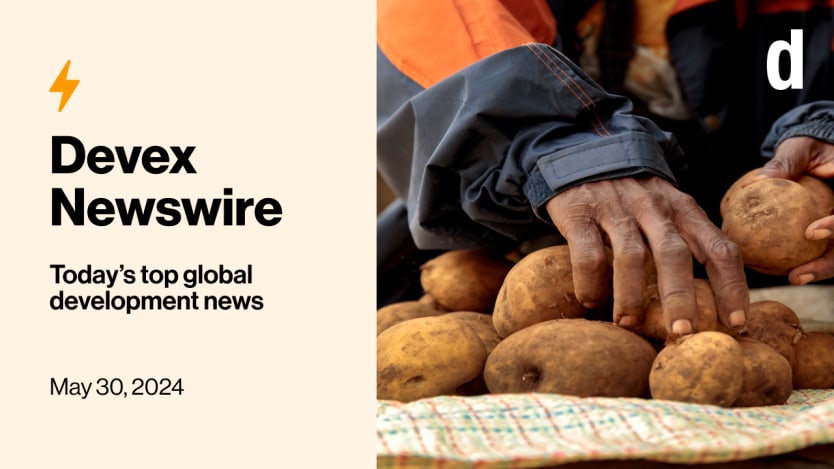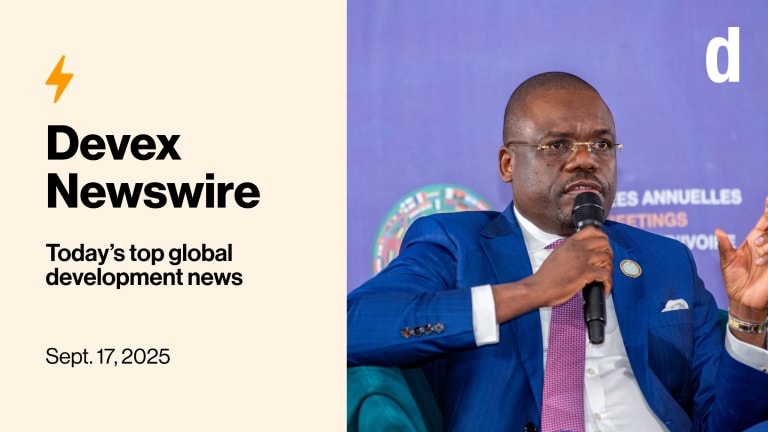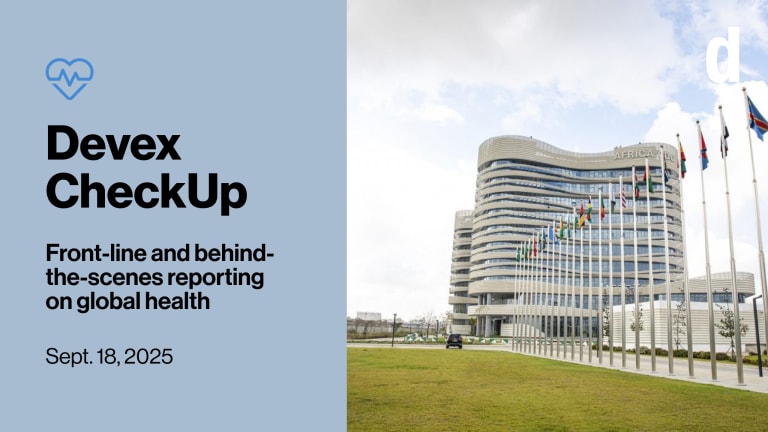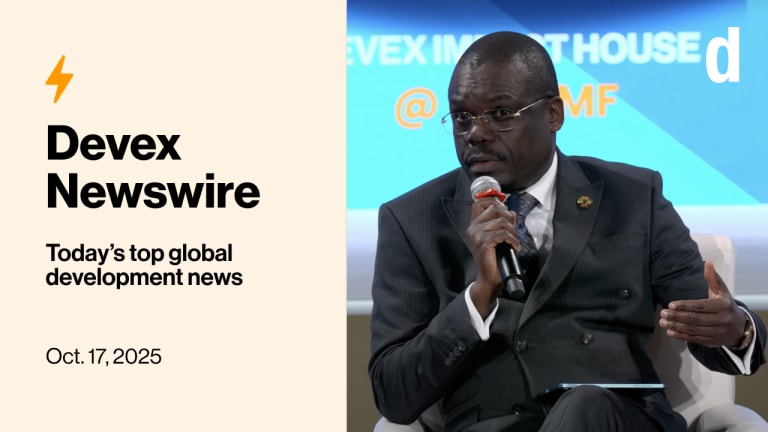
On the first International Day of Potato (not the Potato, simply Potato), we invite you to celebrate in style — that is, by catching up on the 77th World Health Assembly while eating your favorite french fries.
Also in today’s edition: Why therapeutic treatments are still playing second fiddle, and why the head of Africa CDC is holding onto hope amid failure at the World Health Assembly.
+ Want to take in all the proceedings at our two-day Devex CheckUp @ WHA 77 event? You can watch the full recording of day one and day two panel discussions now.
Thanks, spud
This is a preview of Newswire
Sign up to this newsletter for an inside look at the biggest stories in global development, in your inbox daily.
Today is the inaugural International Day of Potato. As a staple food for two-thirds of the world’s population, the potato — in all its 4,000 varieties — is an essential pillar of global food security, providing nutrition and employment across the world. Now, the tuber finally has its chance to shine, along with the scientists that have spent decades breeding potatoes that are more resilient to pests, climate shocks, and disease.
“Major scientific advances have addressed many of the potato’s ancient vulnerabilities that once limited its full potential,” writes Simon Heck, director of the International Potato Center, in an opinion piece for Devex. “Thanks to scientific advances, modern potato varieties are more resilient than ever.”
The center is home to the world’s largest collection of potato genetic material, which is stored in a gene bank in the ancient crop’s first home: Peru. The collection has preserved the raw genetic material of almost all known wild relatives, Heck writes, allowing scientists to select and breed for beneficial traits, fortify varieties with micronutrients, and reduce the crop’s vulnerabilities to blight and other diseases.
Sounds like a crop worth rooting for — and this Devex reporter will be celebrating over a plate of sweet potato fries.
Opinion: Why the potato deserves to finally have its day
Related reading: Can potatoes help to counter climate-fueled hunger in Africa?
+ Sign up to Devex Dish, our free, weekly newsletter covering the transformation of the global food system.
Missed dose
On the other end of the spectrum sit therapeutics, the treatments which experts say are often overshadowed when it comes to pandemic response. Despite therapeutics’ ability to alleviate symptoms and prevent a disease’s progression, during the COVID-19 pandemic, therapeutics remained an afterthought compared to vaccines — and some experts are calling for the tide to change.
While vaccines against COVID-19 were quickly developed, the next pandemic could be a different story, explains my colleague Sara Jerving, who is on the ground at the World Health Assembly in Geneva this week. In that case, disease treatments could become a much more important tool.
Despite that, during the first year of the COVID-19 pandemic, $91 billion was publicly invested on vaccines worldwide compared to just $4.6 billion in therapeutics. Experts say that by the time generic medicines for the virus were developed, they were largely too little too late — and it doesn’t seem like we’ve learned a whole lot since then.
Eloise Todd, the executive director of the Pandemic Action Network, tells Sara the current draft of the pandemic treaty is “quite far” from ideal in terms of equitable access to medical countermeasures, including therapeutics.
Read: Experts call for greater emphasis of therapeutics in pandemic response
+ Devex Pro members can dig deeper into experts’ concerns about the content of the current draft of the pandemic treaty and the pace of negotiations.
Not yet a Pro member? Start your 15-day free trial today to read all our exclusive reporting and analyses as well as get access to networking opportunities at our summits.
Glass half full
The failure to finalize a pandemic treaty at the 77th World Health Assembly this week is an especially big blow to Africa, which bore the brunt of the inequities that materialized during the COVID-19 pandemic. But Dr. Jean Kaseya, director-general of the Africa Centres for Disease Control and Prevention, says he remains positive a deal can get done — possibly this year.
“Let us say we made huge progress. We managed to agree on around 75 to 80% of the text,” he told my colleague Rumbi Chakamba at our Devex CheckUp @ WHA 77 event, adding that he agreed with the South African ambassador on a goal of finalizing the agreement by the end of this year.
Although Africa is home to roughly 18% of the world’s population, “we are carrying 23% of the global disease burden,” Kaseya said, noting also that just 3% of the world’s health workforce resides in Africa and that the continent only accounts for 1% of total health expenditure in the world. “This is a major issue.”
It’s one of many issues Africa CDC is taking on as the young agency increases its autonomy and clout across the continent. It’s had growing pains along the way as it detangles itself from the bureaucracy of the African Union, whose umbrella it falls under — including for Kaseya himself.
After a series of whistleblower complaints, Kaseya ordered an audit to look into the accusations, which ranged from misusing funds to playing favorites. The auditors uncovered evidence to disprove some of the allegations, didn’t have full access to examine others, and raised concerns around weak financial controls and irregular hiring practices. Still, Kaseya said he’s establishing an ethics office and hiring an ombudsman to promote a culture of speaking out across the agency.
“We are there to take seriously all allegations, to address them, and to move on,” he added.
Read: Africa CDC holds out hope for a pandemic treaty
ICYMI: Africa CDC audit warns against creating an 'avenue for fraud'
+ Sara sat down with two African health leaders, Dr. Magda Robalo from the Institute for Global Health and Development and Amref Health Africa's Dr. Githinji Gitahi, to discuss what’s needed to further strengthen Africa’s health security in the latest episode of our special podcast series on WHA 77. Listen to their discussion here.
You’re on mute
At least 1.5 million children in Ukraine have been barred from the classroom since Russia’s full-scale invasion began two years ago. Many have tried to fill the gap with online learning — but issues with connectivity, socialization, and the daily stressors of living in a war zone have hindered student progress.
“The situation is completely different between the pandemic and the war,” Dmytro Zavgorodnii, Ukraine’s deputy minister for digital development, digital transformation, and digitalization, tells Devex contributor Gabriella Jóźwiak.
After the peak of COVID-19, schools could reopen while using precautions like masks, social distancing, and handwashing. But now, Zavgorodnii says there are many parts of the country where online education is the only option — and despite best efforts from the government, donors and organizations, students are the ones paying the price.
Part of that comes down to connectivity, Gabriella writes. While the Ukrainian Ministry of Education has provided more than 200,000 digital devices to children in Ukraine over the past two years, they’re still facing a gap nearly twice that size. And while in-person schooling is impossible for many, there’s still resistance from both donors and educators to invest in online education, especially for the country’s youngest.
“Often [children] are not watched over by caregivers or parents who may be working and not able to monitor what the children are actually doing,” says Sylwia Brzezinska, an attorney for the nonprofit Kids In Need of Defense. “Children miss online lessons, or they are abruptly interrupted because of a bomb alarm in the teacher's place. This is not conducive to a systematic and proper educational process.”
Read: Is online learning to blame for Ukraine’s educational decline?
In other news
A report from the Organisation for Economic Co-operation and Development has confirmed that the $100 billion climate finance by 2020 pledge made by donor countries in 2009 was only met in 2022. [France 24]
The amount of humanitarian aid reaching Gaza has dropped by two-thirds since Israel’s military operations in Rafah began this month. [Reuters]
Melinda French Gates has announced that she will donate $1 billion over two years to causes that support women’s rights around the world. [VOA News]
Sign up to Newswire for an inside look at the biggest stories in global development.
Search for articles
Most Read
- 1
- 2
- 3
- 4
- 5








